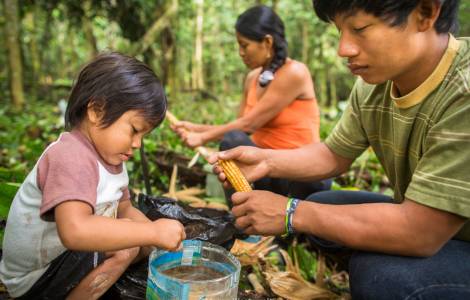
Lima (Agenzia Fides) - "Without the consent of the indigenous peoples of the area and without even consulting them, the province of Purús is approving the construction of roads in the area", says to Fides Ismael Vega, director of the Amazon Center for Anthropology and Applied Practice (CAAAP), an association created in 1974 by the nine dioceses of the Peruvian forest as an institution at the service of the marginalized and excluded populations of the Amazon, in a special way for the indigenous. Vega points out that the construction of infrastructure is based on the "Law of 'carreteras'" approved by Parliament in January. "By approving the law that declares the national roads and the maintenance of dirt roads in the Ucayali region (law N°30.723) as a priority – he states - Parliament once again puts the life of the Amazonian indigenous peoples in serious danger and in particular those in voluntary isolation or in the initial phase of contact who live in that province".
Vega has already underlined in recent months that "this new threat against the indigenous peoples and the Amazon was officially published, while Pope Francis, in his speech in Puerto Maldonado, said that these people today are in danger because of megaprojects of infrastructure and also due to extraction". The "prior consent" provision, established by the International Labor Organization Convention 169, "was ratified by Peru in 2011. But concretely, this rule is not applied: the indigenous peoples are not consulted", says in a dialogue with Fides, Mónica Villanueva, Director of the Communications of the Dominican cultural center for indigenous rights "José Pío Aza" and former president of Signis Latin America and the Caribbean.
The law in question was approved by Congress on December 15 last year, it was not subject to observations or veto by the executive and, after the period established by the Constitution, was promulgated by Parliament.
The President of the Commission, Marco Arana, said that "the law is attentive to the rights of peoples in voluntary isolation, who live in conditions of extreme vulnerability". "The law directly involves three indigenous reserves, two territorial reserves, three national parks and one provincial one", he recalls. The Ministry of Culture, whose competences include the protection of indigenous peoples, had also shown firm rejection of the bill during the debate, for the same reason (SM) (Agenzia Fides, 7/8/2018)